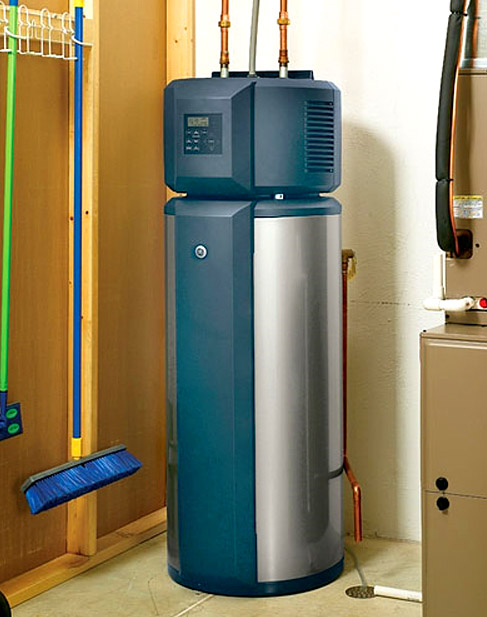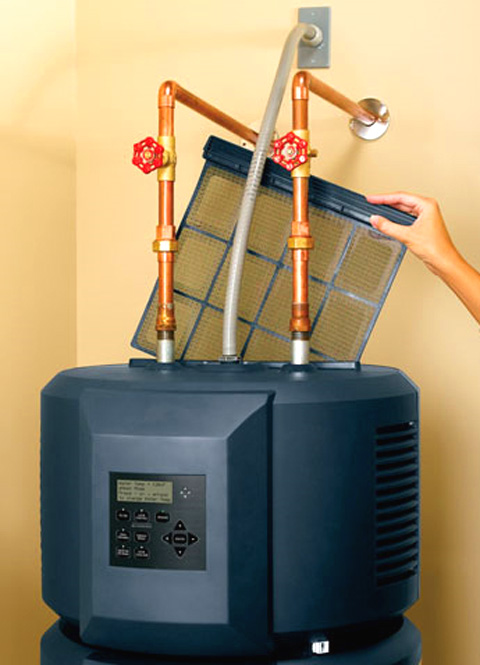New Energy Star energy efficient residential hot water heaters with heat pump
Energy Star recently announced, along with GE appliances, new energy efficient residential hot water heaters with heat pump technology. It used to be this sort of engineering was reserved for air-conditioning systems, but under research in part funded by the US DOE/EPA Energy Star program, manufacturers were encouraged to develop more energy efficient hot water heaters. Energy Star’s previous round of appliances did not include hot water heaters; now they do.

The new heat pump energy efficient residential hot water heaters must have an Energy Factor of at least 2.0 to qualify for the Energy Star label. This means that the heat pump hot water heaters are at least twice as energy efficient as a standard hot water heater, providing the same amount of hot water in the same time.
Rand Soellner, AIA/NCARB takes yearly courses for CEUs (Continuing Education Courses) and he recently took one provided by GE Appliances, authored by Celeste Allen Novak, AIA, LEED AP. The information for this article on the Rand Soellner HOME ARCHITECTS TM website substantially comes from that information source.
This new heat pump hot water heater is part of a new breed of Smart Appliances that helps monitor your electrical consumption. It will automatically cycle different modes of operation to reduce your utility bill, and of course, reduce the amount of power Americans need to operate their houses.
Rand Soellner remembers that Florida Power Corporation had a similar radio controlled switch on a heat pump air-conditioning system in a home he owned in the Orlando area in the early 1980s. Florida Power would turn off electricity to the heat pump during peak load demand times. This lowered Soellner’s monthly utility bill and helped the power company by delaying the construction of additional power plants, which were and are very costly.

.
.
Energy Star is run by the U.S. Department of Energy and the Environmental Protection Agency. Their goal is to conserve energy and water in a sustainable manner, that results in economical costs for purchase and operation of appliances and other components and features of homes and commercial buildings. In this case, the DEQ (Department of Environmental Quality) is assisting funding of the efforts stimulating research and development of energy efficient appliances. Part of the current initiative includes a “Smart Grid,” which will hopefully avoid power blackouts that have crippled America in the past (e.g. 2003).
Power consumption of the new heat pump hot water heaters is about $220/year, compared with approximately $520/year for a conventional electric model without the new technology. In other words, you can save about $300+/-/year under the current costs of electricity. Hot water heaters represent about 14% of U.S. Household’s energy consumption (using old technologies).
A new 50 gallon, energy efficient heat pump residential hot water heater would consume about 2,195 kilowatt-hours per year. This is a 55% savings of power, compared to a traditional electric hot water heater, which consumes about 4,857 kilowatt-hours per year. There are about 4.8 million electric hot water heaters sold each year in the U.S. The DOE estimates that if only about a tenth of those were instead the new energy efficient heat pump hot water heater, that America would save around 1.3 billion kilowatt-hours annually. If you understand that every kilowatt-hour represents fossil fuels burned and carbon released into the atmosphere, just changing to a more efficient hot water heater can help make a greener world.
COSTS/ TAX SAVINGS: There is presently a 30% Federal tax credit on the heat pump hot water heaters. Purchasing and installing a new heat pump hot water heater will typically run between $1,500 to $2,000, subject to your local contractors. Rand Soellner believes that to purchase and install just one of his 75 gallon LP gas hot water heaters several years ago was around $1,000. So, the objective is to see if we can save at least $1,000 on the cost the new energy efficient heat pump hot water heaters.
Different states have different credits as incentives for you to acquire more energy efficient devices in your house. For instance, in Kentucky, a $1,500 installed heat pump hot water heater cost can be nearly equalized. How? A $450 Federal tax credit, a $100 rebate from the local utility company, and a $250 State tax credit adds up to $800 worth of incentives. If you throw in a yearly operating savings of around $320, the energy efficient hot water heater completely pays for itself within about 2 to 3 years. Now that’s a pretty swift payback! Also, the homeowners enjoy reduced operating cost for the life of the unit.
There is a database of incentives for energy efficient devices, called: DSIRE (Database of State Incentives for Renewables & Efficiency). It was created in 1995 and is funded by the U.S. DOE.
Contact for energy efficient residential hot water heater architects:
Rand Soellner HOME ARCHITECTS TM
1. 828. 269. 9046
rand@homearchitects.com
———————————-
 GREEN HOME DESIGN UNIVERSITY QUESTIONS, for those of you taking Rand Soellner Architect’s course of green instruction: about the above subject:
GREEN HOME DESIGN UNIVERSITY QUESTIONS, for those of you taking Rand Soellner Architect’s course of green instruction: about the above subject:
1. Heat pump technology can be used to make what devices more efficient?
a. Air-conditioning.
b. Bicycle tire inflation.
c. New hot water heaters.
d. All of the above.
e. A & C.
2. How much money a year can the new energy efficient hot water heaters save over traditional all-electric hot water heaters?
a. None.
b. $300 to $320.
c. $2,500.
3. Why should anyone care about having more energy efficient hot water heaters?
a. It will use less electricity, and therefore cost less to operate.
b. America’s utility company will consume less fossil fuels and therefore contribute less carbon to greenhouse gas emissions, thereby helping to reduce global warming.
c. No one needs to be concerned about a thing.
d. All of the above.
e. A. & B.
If you are continuing in your Green Home Design University course to the next level,
Favorite this page now, by clicking on your “Favorites” menu choice in the upper left of your Windows Internet Explorer window,
then click here: Certificate of Green Understanding to go to the next level 61, which is your Certificate of Green Understanding award! You have now completed your Green Home Design course of study at Rand Soellner Architect’s Green Home Design University.
———————————-
answers:
1. e., 2. b. , 3. e.
———————————-
